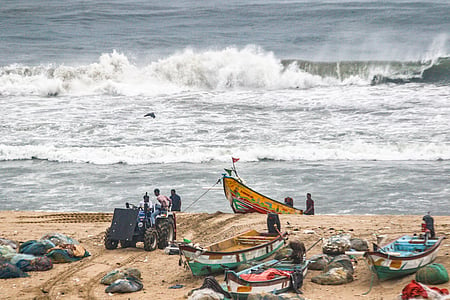India on high alert as Cyclone Montha nears landfall in Andhra Pradesh
Tens of thousands evacuated, ports hoist danger signals, trains cancelled

India’s eastern seaboard is on high alert as severe Cyclone Montha, swirling over the Bay of Bengal, is set to make landfall on Tuesday evening near the Andhra Pradesh coast between Machilipatnam and Kalingapatnam, close to Kakinada. Authorities have shut schools, cancelled dozens of trains, evacuated tens of thousands from vulnerable villages, and issued red alerts for coastal districts.
Schools shut, villages evacuated
Indian authorities have ordered schools and colleges to remain closed till Wednesday. As many as 38,000 people have been shifted from low-lying areas of Andhra Pradesh to relief camps, according to state disaster officials.
The government has readied 1,906 relief camps and 364 school shelters as evacuations continue across 1,238 vulnerable villages, state minister for communications Nara Lokesh said in a social media post.
In Odisha, about 32,000 people are being moved from vulnerable zones to safer shelters. Fishermen have been warned not to venture into the sea, and flight services have been partially disrupted.
The India Meteorological Department (IMD) has forecast winds of 90–100 kmph, gusting up to 110 kmph, and issued a red alert for 19 districts in coastal Andhra Pradesh. Neighbouring states — Tamil Nadu, Telangana, Kerala, and Karnataka — are also expected to receive moderate to heavy rainfall.
Factbox: Cyclone Montha preparedness
Landfall: Expected Tuesday evening/night near Kakinada, Andhra Pradesh
Wind speeds: 90–100 kmph, gusting up to 110 kmph (IMD)
Evacuations: 38,000 in Andhra Pradesh, 32,000 in Odisha
Schools/colleges: Closed till Wednesday in Andhra Pradesh
Relief camps: 1,906 camps, 364 school shelters ready in Andhra Pradesh
Ports: Danger signals hoisted, high wave alerts issued
Trains: 32 cancelled, 2 short-terminated, 1 diverted
Danger signals at ports, high wave alerts
Authorities hoisted danger signal seven at Kakinada port on Tuesday morning, the highest warning for ships. Signals six and five were hoisted at Visakhapatnam, Gangavaram, Machilipatnam, Nizampatnam, and Krishnapatnam ports.
The Indian National Centre for Ocean Information Services (INCOIS) has forecast high waves ranging between 3 and 4.7 meters, advising small vessels to stay away from shore and warning of possible coastal erosion and wave surges.
CM Naidu calls for all-party relief effort
Andhra Pradesh Chief Minister N. Chandrababu Naidu urged National Democratic Alliance (NDA) MPs, MLAs, ministers, and party cadres to be on the ground to help people in cyclone-hit areas.
“In a time of calamity, from cadre to leader, everyone should help people,” he said during a teleconference with NDA leaders, adding that the government was committed to “completely reducing the loss of life and preventing property damage.”
“We are sending messages to mobile phones in real time depending on the severity of the situation. We have informed the authorities about the steps to be taken to save the crops from being submerged,” Naidu said.
The chief minister recalled how the state had effectively tackled past storms like Titli and Hudhud, and expressed confidence that Montha would be managed with the same preparedness.
Railways cancel 32 trains, divert services
The Indian Railways has cancelled 32 trains passing through Visakhapatnam in view of Montha’s landfall, citing passenger safety.
“For the Montha cyclone, which is expected to touch Kakinada, we have taken a lot of precautions regarding that. We have cancelled 32 trains passing through Visakhapatnam so that travellers are not affected much,” said Deepak Rout, Chief Public Relations Officer of East Coast Railway.
The Tatanagar–Ernakulam Express has been diverted, while the Bhubaneswar–Jagdalpur and Rourkela–Jagdalpur Express trains have been short-terminated.
Cyclone intensifies with climate change context
Cyclone Montha is the latest reminder of India’s increasing vulnerability to extreme weather. “Global warming is increasing the air temperature and is also making oceans warm. And if an ocean is very warm, it is going to supply a lot of energy to any tropical storm over the ocean,” said Akshay Deoras, meteorologist at the University of Reading.
India’s eastern coast is frequently battered by cyclones, but scientists warn they are becoming stronger and less predictable. The year 2023 was the deadliest cyclone season in recent years, killing 523 people and causing $2.5 billion in damage.
According to the Emergency Events Database maintained by the University of Louvain, Asia recorded 167 disasters in 2024 alone — the highest globally — causing losses of over $32 billion.
Sign up for the Daily Briefing
Get the latest news and updates straight to your inbox
Network Links
GN StoreDownload our app
© Al Nisr Publishing LLC 2026. All rights reserved.
